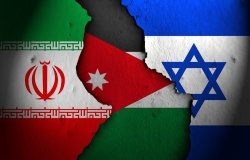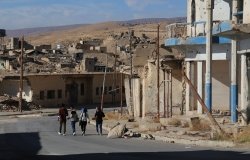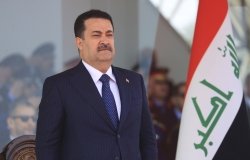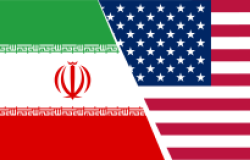Of Revolutions, Regime Change and State Collapse in the Arab World
David Ottaway, Senior Scholar at the Woodrow Wilson International Center for Scholars, and Marina Ottaway, Director of the Middle East Program at Carnegie Endowment for International Peace, published a piece for Carnegie Endowment and for the Middle East Program at the Wilson Center on "Of Revolutions, Regime Change and State Collapse in the Arab World."
With breath-taking speed, massive popular protests across the Arab world have swept away two Arab strongmen and shaken half a dozen monarchies and republics to their core. But the Arab world has yet to witness any fundamental change in ruling elites and even less in the nature of governance.
Libya now seems poised to be the first country to see a true change in governance, thanks to Muammar Qaddafi's megalomania and his amorphous jamahiriya (state of the masses). But such change may not have a happy ending. The damage Qaddafi has inflicted on his country is likely to extend well past his demise because he leaves behind a weak state without functioning institutions.
The uprisings sweeping across the Middle East have similar causes and share certain conditions: authoritarian and ossified regimes, economic hardship, growing contrast between great wealth and dire poverty, all worsened by the extraordinarily large number of young people who demand a better future. But the consequences will not be the same everywhere. JLJ
Tunisia and Egypt: A System Still in Place
Pro-democracy protesters in Tunisia and Egypt have been quick to use the word "revolution" to describe their astounding achievement in forcing Presidents Zine el Abidine Ben Ali and Hosni Mubarak from power after decades of rule. Tunisia's "Jasmine revolution" and Egypt's "January 25 Revolution" have certainly injected the long-silenced voice of the people into the autocratic politics of the region. But they have not brought to the fore a new ruling class, system of governance, or the profound social and economic changes associated with the classical meaning of revolution. And it remains to be seen whether they will succeed in doing so.
The protesters who keep turning out after Friday prayers in Cairo's Tahrir Square and on Tunis's Avenue Bourguiba are absolutely right to keep pressing their cause. They have their work cut out for them. Mubarak and Ben Ali may be gone, but the individuals and institutions overseeing the transition remain the same—the old cronies of the former presidents and the pillars of the old regimes. Prime Minister Ahmed Shafiq in Egypt was appointed by Mubarak days before he resigned. Mohammed Ghannouchi in Tunisia had been prime minister since 1999. In both countries, the same well-developed bureaucratic states and powerful military and security forces that buttressed authoritarian rule remain intact and seemingly determined to curb the pro-democracy momentum generated so far. A change in ruling elites and system of governance is still a distant goal.
Libya: A System Built Around Qaddafi
The fall of Qaddafi will be a different matter. By necessity it will bring about both a new leadership and entirely different system of government. His downfall will create a vacuum because the political house he built, inspired by his rambling Green Book of philosophical socialist musings, is now being blown away with him. The mercurial Revolutionary Leader really does believe "l'etat, c'est moi," or perhaps more precisely, l'etat, c'est ma famille." Intermediary bodies between himself and "the masses" of his Jamahiriya were few, deliberately fragmented, and carefully controlled.
Qaddafi allowed no political parties and no civil society organizations. He labeled everything "revolutionary" or" the people's" this or that to build an imaginary "direct democracy" with an unlikely national anthem of "Allahu Akbar," or "God is Great." His system of governance, defined not by a constitution but by a Declaration of the Establishment of the People's Authority, consisted of 2,700 local "basic people's congresses" that met just three times a year. They sent delegates to state congresses which in turn selected the 760 members of the General People's Congress that met at The Leader's whim and will. He called his cabinet "the General People's Committee" and the Politburo of his non-existent party "the Revolutionary Command Council."
Few Libyans even understood how the system was supposed to work: an attempt by one of us a few years ago to obtain clarifications about the confusing system from a Libyan diplomat elicited the answer that he really had no idea. In reality, the complex revolutionary trappings were a thin screen behind which Qaddafi manipulated Libya's tricky tribal politics, favoring three groups in particular: his own Qaddafa tribe plus the Maghraha and the Warfalla. No Libyan or out sider ever believed that anybody other than Qaddafi himself (or perhaps one his seven sons) decided anything.
Qaddafi's Fall Could Mean the Collapse of the State
If Qaddafi's demise only entailed the dissolution of his regime, it would be tempting to declare good riddance and hail the good fortune of the Libyan people in freeing themselves of the old regime in one blow, without having to deal with its remnants, as Tunisians and Egyptians are struggling to do. Unfortunately for Libya, the fall of the House of Qaddafi will not only put an end to his regime, but risks causing the collapse of the Libyan state. Qaddafi's long reign did nothing to forge institutions than can ensure the continuity of the state beyond regime change. There is no well-organized bureaucracy to ensure administrative continuity. The military and security forces, the institutions of last recourse in weak states, were deliberately fragmented by Qaddafi into militias and special brigades led by his sons and counterbalanced by a large praetorian guard and various paramilitary groups.
The weakness of state institutions is already apparent in the eastern part of the country, which is now under the control of anti-government movements. Reports indicate that insurgents are trying to organize ad hoc committees to keep order, direct traffic, maintain services, and even protect oil installations. Many efforts are carried out at the community level, but attempts are also underway to form a new government. Led by former Justice Minister Mustafa Abdel Jelil and the professional class of the city of Benghazi, the temporary governing mechanism is reaching out to tribal councils for support. In the vacuum created by the collapse of the Qaddafi regime in the eastern part of Libya, the country's tribal structure appears to be the only enduring element. In Egypt and Tunisia, the permanent features are the bureaucracy and the military and security forces.
An Uncertain Outlook for Democracy
Key to the outcome for Tunisia, Egypt, and Libya is whether a functioning state exists. Without a state, democracy is unlikely—if not outright impossible. Democracy can only emerge in the context of functioning institutions, not of chaos. Unfortunately, the strong state institutions also bolstered the old regimes. They were not one-man affairs: no matter how authoritarian Mubarak or Ben Ali were, they did not rule single-handedly . Their regimes were multi-layered, supported by massive security apparatuses and extensive bureaucracies, and used, among other purposes, to produce landslide electoral victories for the ruling parties.
Countries with such strong state and regime structures are difficult to change. Both Egypt and Tunisia may in the end weather the crisis with little—indeed too little—change, by sacrificing the presidents and their families and scapegoating the top layer of politicians. But the maneuver to stymie change may not succeed if protesters keep up the pressure—the sudden resignation of Tunisia's Ghannouchi on February 27 testifies to the importance of continuing popular pressure. If protesters succeed in bearing prolonged pressure on the regimes and force them to introduce more far reaching reforms, however, countries like Egypt and Tunisia stand a chance of developing into democracies, because they have the necessary prerequisite of stable state structures.
In countries like Libya or Yemen, where such structures are weak or non-existent and the autocrat holds the country together through a web of personal relations, the prospects for democracy appear far more problematic. A sustained uprising in such countries could lead to sudden and complete regime change, since the leaders and their immediate entourage constitute the entire regime. Even the state is likely to collapse because there are no underlying structures independent of the top leaders. Regime change thus would be extremely unlikely to lead to democracy. More likely, the outcome would be a variation of the fragmentation that has bedeviled Somalia for twenty years.
Related Programs

Middle East Program
The Wilson Center’s Middle East Program serves as a crucial resource for the policymaking community and beyond, providing analyses and research that helps inform US foreign policymaking, stimulates public debate, and expands knowledge about issues in the wider Middle East and North Africa (MENA) region. Read more

Environmental Change and Security Program
The Environmental Change and Security Program (ECSP) explores the connections between environmental change, health, and population dynamics and their links to conflict, human insecurity, and foreign policy. Read more










